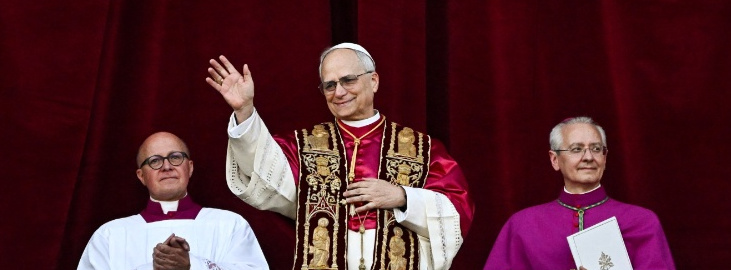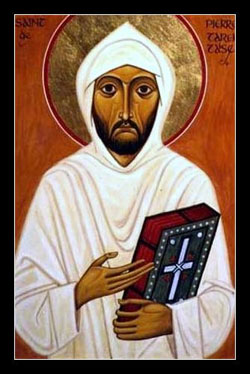We ask you, urgently: don't scroll past this
Dear readers, Catholic Online was de-platformed by Shopify for our pro-life beliefs. They shut down our Catholic Online, Catholic Online School, Prayer Candles, and Catholic Online Learning Resources essential faith tools serving over 1.4 million students and millions of families worldwide. Our founders, now in their 70's, just gave their entire life savings to protect this mission. But fewer than 2% of readers donate. If everyone gave just $5, the cost of a coffee, we could rebuild stronger and keep Catholic education free for all. Stand with us in faith. Thank you.Help Now >
For Science With a Conscience
FREE Catholic Classes
Interview With Author Mariano Artigas
PAMPLONA, Spain, MARCH 24, 2004 (Zenit) - Science and faith have much to contribute to one another, says Mariano Artigas, who has just updated the sixth edition of his book "Science, Reason and Faith."
In this interview, Artigas, who teaches philosophy of nature and of sciences at the University of Navarre, says that "with a proper combination of the religious sense and of scientific and technical knowledge, many of the more serious problems that humanity suffers today could be resolved."
Artigas is a member of the International Academy of Philosophy of Sciences of Brussels and of the Holy See's Pontifical Academy of St. Thomas.
Q: Does Galileo continue to be an unresolved problem?
Artigas: When I speak of the Galileo case as an unresolved problem I am referring to the value of scientific theories. Cardinal Bellarmine said to Galileo that he would have no problems if he [Galileo] presented his theory as a hypothetical model, useful to calculate phenomena.
Pope Urban VIII said that one could not know if [Galileo's] model was true, because God is almighty and perhaps the effects we observe are due to causes that do not agree with our theory.
Galileo believed that the new science sought truth and could attain it; he was a realist. So am I.
However, at present, the opposite idea is widespread. The Galileo case is very long and complicated; very few people know it well.
Recently I published "Galileo in Rome" [Oxford University Press], together with William Shea, one of the best specialists on Galileo. In that book we give all the data, to know exactly what happened, taking as an outline the six trips Galileo made to Rome.
Q: What are today's "new Galileo cases"?
Artigas: There has been no other case like Galileo's. The Church authorities learned the lesson. The closest would be evolutionism. There was opposition. In fact, I am currently preparing a book in which I use the documents, unknown until now, of the Holy Office's archive. However, there was never a condemnation of evolutionism by the authorities of Rome.
Present-day problems such as abortion, sexual ethics or bioethics have nothing to do with the Galileo case. The Church accepts all of science's data; it is simply not in agreement that it is morally correct to do everything that existing technology allows.
I would say that at present the danger is rather that there are cases that are the reverse of the Galileo case. That is, that there are scientists and philosophers who use the authority of science to pontificate on religious or moral questions that are outside the domain of science.
Q: In simple language, what is the Church's position in regard to evolutionism?
Artigas: In 1950, in the encyclical "Humani Generis," Pope Pius XII said that evolutionism was a hypothesis, that the origin of the human organism could be discussed as long as it is admitted that God creates a spiritual soul in each human being.
In 1996, Pope John Paul II referred to evolutionism as something more than a hypothesis that is supported by a series of independent proofs, and he affirmed that problems do not arise from science, but from materialist ideologies that are not scientific.
Q: How does faith help science and vice versa?
Artigas: Science occupies a central place in our civilization and, given its enormous prestige, there is a danger similar to that of absolute majorities in politics: not to pay attention to other approaches.
Faith shows that a spiritual world exists which science does not reach, and helps to give real meaning to science as the search for truth and service to humanity, in keeping with God's plans.
In turn, science supplies many means to improve the quality of human life. With a proper combination of the religious sense and of scientific and technical knowledge, many of the more serious problems that humanity suffers today could be resolved.
Q: Do we depend totally on science or do we have a certain margin of autonomy?
Artigas: Science is a human product. We are the ones who make it. It is absurd that at times we are the victims of our own product.
I have already said that I am a realist. There is an order in nature that is there and that we cannot invent. We try through science to know it increasingly better and we learn to use it in a controlled manner. But science cannot tell us how to use that knowledge.
Science must be complemented by a meta-scientific reflection, of a philosophical, moral and religious sort. Science calls for the complement of conscience.
It gives us a power that is ever greater, but it is a mistake to think that everything that can be done is right. It is our responsibility to focus science and technology, which is based on science, correctly.
Contact
Catholic Online
https://www.catholic.org
CA, US
Catholic Online - Publisher, 661 869-1000
info@yourcatholicvoice.org
Keywords
Science, Faith, Reason, Catholic
More Catholic PRWire
Showing 1 - 50 of 4,716
A Recession Antidote
Randy Hain
Monaco & The Vatican: Monaco's Grace Kelly Exhibit to Rome--A Review of Monegasque-Holy See Diplomatic History
Dna. Maria St. Catherine Sharpe, t.o.s.m., T.O.SS.T.
The Why of Jesus' Death: A Pauline Perspective
Jerom Paul
A Royal Betrayal: Catholic Monaco Liberalizes Abortion
Dna. Maria St.Catherine De Grace Sharpe, t.o.s.m., T.O.SS.T.
Embrace every moment as sacred time
Mary Regina Morrell
My Dad
JoMarie Grinkiewicz
Letting go is simple wisdom with divine potential
Mary Regina Morrell
Father Lombardi's Address on Catholic Media
Catholic Online
Pope's Words to Pontifical Latin American College
Catholic Online
Prelate: Genetics Needs a Conscience
Catholic Online
State Aid for Catholic Schools: Help or Hindrance?
Catholic Online
Scorsese Planning Movie on Japanese Martyrs
Catholic Online
2 Nuns Kidnapped in Kenya Set Free
Catholic Online
Holy See-Israel Negotiation Moves Forward
Catholic Online
Franchising to Evangelize
Catholic Online
Catholics Decry Anti-Christianity in Israel
Catholic Online
Pope and Gordon Brown Meet About Development Aid
Catholic Online
Pontiff Backs Latin America's Continental Mission
Catholic Online
Cardinal Warns Against Anti-Catholic Education
Catholic Online
Full Circle
Robert Gieb
Three words to a deeper faith
Paul Sposite
Relections for Lent 2009
chris anthony
Wisdom lies beyond the surface of life
Mary Regina Morrell
World Food Program Director on Lent
Catholic Online
Moral Clarity
DAN SHEA
Pope's Lenten Message for 2009
Catholic Online
A Prayer for Monaco: Remembering the Faith Legacy of Prince Rainier III & Princess Grace and Contemplating the Moral Challenges of Prince Albert II
Dna. Maria St. Catherine Sharpe
Keeping a Lid on Permissiveness
Sally Connolly
Glimpse of Me
Sarah Reinhard
The 3 stages of life
Michele Szekely
Sex and the Married Woman
Cheryl Dickow
A Catholic Woman Returns to the Church
Cheryl Dickow
Modernity & Morality
Dan Shea
Just a Minute
Sarah Reinhard
Catholic identity ... triumphant reemergence!
Hugh McNichol
Edging God Out
Paul Sposite
Burying a St. Joseph Statue
Cheryl Dickow
George Bush Speaks on Papal Visit
Catholic Online
Sometimes moving forward means moving the canoe
Mary Regina Morrell
Action Changes Things: Teaching our Kids about Community Service
Lisa Hendey
Easter... A Way of Life
Paul Spoisite
Papal initiative...peace and harmony!
Hugh McNichol
Proclaim the mysteries of the Resurrection!
Hugh McNichol
Jerusalem Patriarch's Easter Message
Catholic Online
Good Friday Sermon of Father Cantalamessa
Catholic Online
Papal Address at the End of the Way of the Cross
Catholic Online
Cardinal Zen's Meditations for Via Crucis
Catholic Online
Interview With Vatican Aide on Jewish-Catholic Relations
Catholic Online
Pope Benedict XVI On the Easter Triduum
Catholic Online
Holy Saturday...anticipation!
Hugh McNichol
Join the Movement
When you sign up below, you don't just join an email list - you're joining an entire movement for Free world class Catholic education.

Pope Leo XIV – First American Pope
-

- Easter / Lent
- Ascension Day
- 7 Morning Prayers
- Mysteries of the Rosary
- Litany of the Bl. Virgin Mary
- Popular Saints
- Popular Prayers
- Female Saints
- Saint Feast Days by Month
- Stations of the Cross
- St. Francis of Assisi
- St. Michael the Archangel
- The Apostles' Creed
- Unfailing Prayer to St. Anthony
- Pray the Rosary
Pope Leo XIV’s First Speech – Translated to English
Who Is Pope Leo XIV?
Cardinal Robert Prevost Elected As Pope Leo XIV – First American Pope
Daily Catholic
 Daily Readings for Friday, May 09, 2025
Daily Readings for Friday, May 09, 2025 St. Pachomius: Saint of the Day for Friday, May 09, 2025
St. Pachomius: Saint of the Day for Friday, May 09, 2025 Prayer for Travelers: Prayer of the Day for Friday, May 09, 2025
Prayer for Travelers: Prayer of the Day for Friday, May 09, 2025 Daily Readings for Thursday, May 08, 2025
Daily Readings for Thursday, May 08, 2025 St. Peter of Tarantaise: Saint of the Day for Thursday, May 08, 2025
St. Peter of Tarantaise: Saint of the Day for Thursday, May 08, 2025- St. Augustine's Prayer to the Holy Spirit: Prayer of the Day for Thursday, May 08, 2025
![]()
Copyright 2025 Catholic Online. All materials contained on this site, whether written, audible or visual are the exclusive property of Catholic Online and are protected under U.S. and International copyright laws, © Copyright 2025 Catholic Online. Any unauthorized use, without prior written consent of Catholic Online is strictly forbidden and prohibited.
Catholic Online is a Project of Your Catholic Voice Foundation, a Not-for-Profit Corporation. Your Catholic Voice Foundation has been granted a recognition of tax exemption under Section 501(c)(3) of the Internal Revenue Code. Federal Tax Identification Number: 81-0596847. Your gift is tax-deductible as allowed by law.





 Daily Readings for Friday, May 09, 2025
Daily Readings for Friday, May 09, 2025 St. Pachomius: Saint of the Day for Friday, May 09, 2025
St. Pachomius: Saint of the Day for Friday, May 09, 2025 Prayer for Travelers: Prayer of the Day for Friday, May 09, 2025
Prayer for Travelers: Prayer of the Day for Friday, May 09, 2025 St. Peter of Tarantaise: Saint of the Day for Thursday, May 08, 2025
St. Peter of Tarantaise: Saint of the Day for Thursday, May 08, 2025


